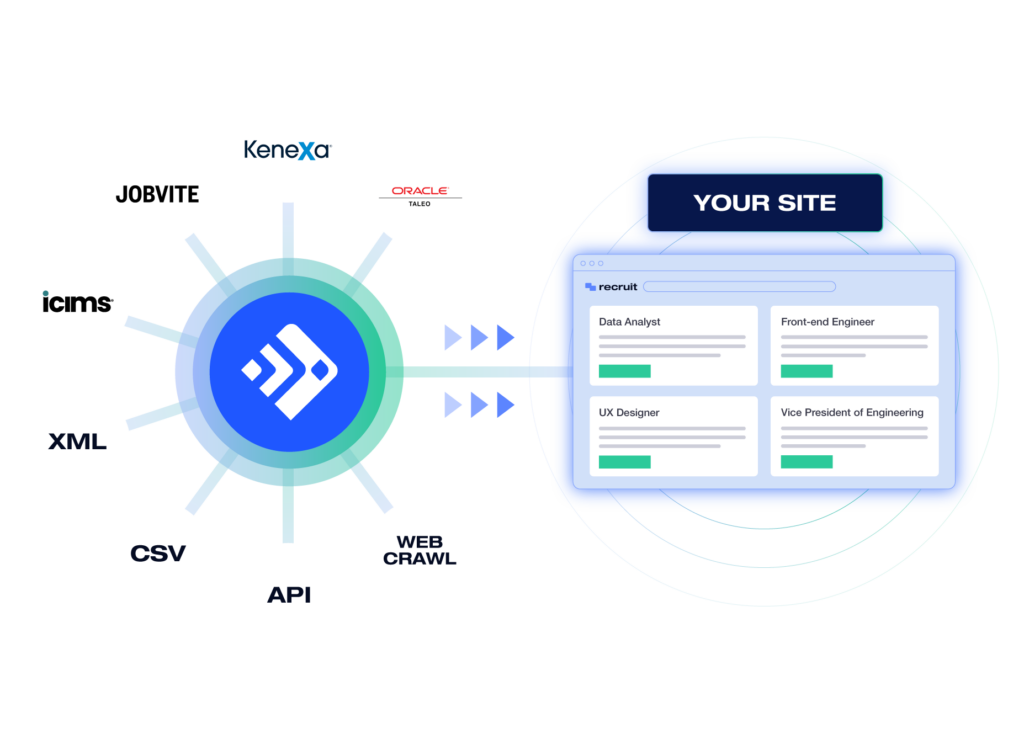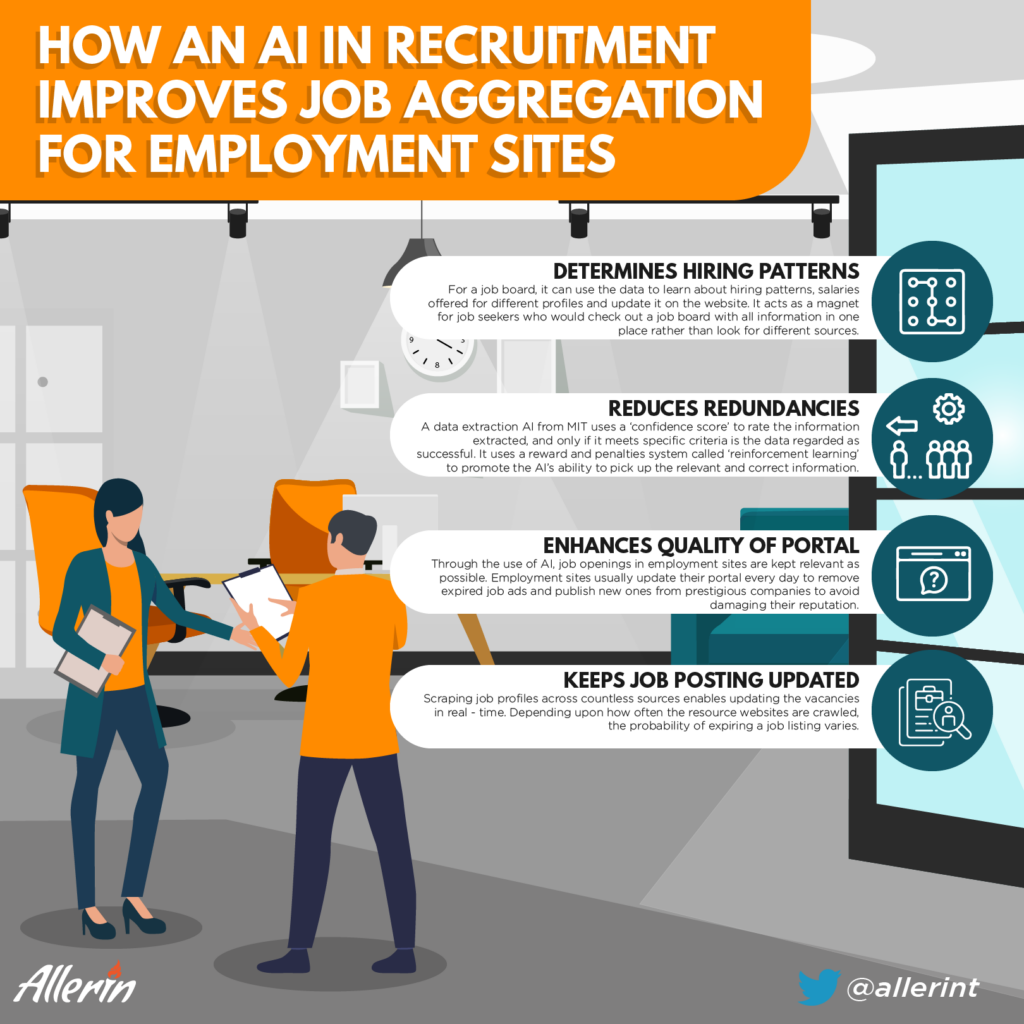Job aggregator take up the most critical role in the job-market sphere today. As the sources of job data grow, aggregating them and displaying them all in a single place while providing you with sort, search, and filter functionalities becomes the biggest challenge.
These platforms also allow keyword searches, finding job posts for specific job roles, industry-specific or region-specific job pages, skillset lists for common job roles, and more. Job aggregator is highly beneficial to both job seekers and job market analysts who would have otherwise needed to browse tens or hundreds of different websites to find the necessary information.
How Do Job Aggregators Work?

Image Source: Feedonomics
Gathering Job Data-
Given that job data sits at the heart of it all, gathering job data is the most critical activity performed by job aggregator sites. Data is collected from various sources via one of two methods- a. Fetching Job Data via APIs and b. Scraping job data from websites that do not offer APIs for data fetch. Data is fetched from company websites, recruitment portals, job boards, and any other platform used for advertising vacancies.
Indexing and tagging-
Having a ton of data would be of use unless you can find what you need within the data. Indexing the data and adding relevant tags enables users to traverse large datasets of job posts and find out exactly what they are looking for. Tagging can be for various categories, such as job industry, seniority of job, region, salary range, age of job posts, and more.
Search and Filtering-
Once the data is indexed and tagged, functionalities like search and filter are easy to set up. Filters are specifically useful since almost no one wants to look at jobs from all sources at the same time. Instead, a job list generated as a result of a specific filter is more useful.
Redirecting to original job application-
The last functionality that is commonly offered is integration with source websites. This enables users to be able to access the source job post or apply to the actual job post via the job aggregator site itself. It also enables companies to view the actual job post and find more relevant information if necessary.
What are The Benefits of Job Aggregator Websites?
Job aggregator do not participate in the hiring process but instead, serve as a platform for a live job dataset. Their platforms are beneficial not just for job seekers but also for corporates:
Single location for all data-
Individuals or corporations would normally need to go through tens of websites to find the data they are looking for. In case someone is trying to perform market research, the number may run into hundreds. Job Aggregator help in providing everything on the same plate along with added information and functionalities.
Enhanced visibility for jobs-
When companies post jobs on a particular job board or the career page of the company’s website, the visibility is limited. However, if this job post is collected and re-shared by an aggregator, then the visibility is increased manifold. The job post would get the proper tags, it would be shown when individuals select specific filters and it would reach a much larger crowd than it originally could have.
Cost Effective-
Getting job market data from hundreds of sources is no mean feat. Creating a system that can do so may take months if not years and a full-blown tech team. Instead, subscribing to the services of a job aggregator and paying based on what you need is far more cost-effective and also allows you to start right away instead of worrying about the infrastructure on which the data lies.
Access to real-time as well as historical job data-
While job boards and websites may still be able to show you a large collection of live jobs or slightly stale ones, true job aggregator allow you to access data that is years old and access a live job data feed. Historical data helps in understanding the effects of various macroeconomic factors on the job market and enables the talent management team to prepare for contingencies.
Predictive engines can be built on top of the data-
Job Aggregator are the only reason why predictive engines can be built on top of job data. Without having a live data stream of job posts that aggregates data from different regions and industries, one would not be able to build a live predictive model. Such models can be used for various purposes like matching jobs to candidates, predicting the chances of a candidate securing a job, or suggesting what salary and perks should be offered for a job with a set of requirements and responsibilities.
Data-driven talent management-
As companies move towards smart talent management, data stands as the backbone in enabling them to work smart and with a leaner team. From creating new job posts to deciding on up-skilling requirements, all can be done using data fetched from an aggregation platform.
Exploring the Benefits of Job Board Aggregator

Image Source: Allerin
Navigating the job market can be overwhelming, but job board aggregator simplify the process by consolidating listings from multiple sources into a single, easily searchable platform. A job board aggregator collects job postings from various job boards, company websites, and recruitment agencies, providing job seekers with a comprehensive view of available opportunities. This not only saves time but also ensures that users do not miss out on potential job matches. By utilizing a job board aggregator, candidates can efficiently explore a wide range of job openings, tailor their search to specific criteria, and stay updated with the latest listings in their field of interest.
One of the key advantages of using a job board aggregator is the ability to access a vast array of job listings in one place. Instead of manually searching through multiple websites, job seekers can use a single platform to find openings that match their skills and preferences. This streamlined approach reduces the time and effort required to identify suitable positions, allowing candidates to focus more on tailoring their applications and preparing for interviews.
What are Some of the Popular Job Aggregation Websites?
Some of the popular job aggregator today are LinkedIn, Indeed, Glassdoor, Monster, and SimplyHired. However, something to keep in mind is that very few of them have API-based integrations available so in case you need data in bulk, you may need to write your web scraping system to get all the aggregate job data. Job seekers are the target audience of these websites.
When it comes to job aggregation, several websites stand out for their comprehensive databases and user-friendly interfaces. Indeed is one of the most well-known job aggregators, offering millions of job listings from various sources, including company websites and job boards. Similarly, SimplyHired aggregates job postings from a wide range of websites, providing extensive search filters and job alerts. LinkedIn, while primarily a professional networking site, also serves as a powerful job board aggregator, connecting users with job opportunities tailored to their profiles and networks. Another notable platform is Glassdoor, which not only aggregates job listings but also offers company reviews and salary information, helping job seekers make informed decisions. These popular job aggregation websites provide valuable resources for anyone looking to navigate the job market efficiently and effectively.
For companies or agencies interested in using a live job data feed or job data in bulk amounts for conducting analysis or creating ML models, the best bet is DaaS providers like JobsPikr. Our team at JobsPikr provides you with a live job data feed that can be used for discovering global job trends.
Having experience with more than 200 companies which include customers like Infosys, UpGrad, Randall Reily, and Workable, we can provide quick job-data-powered solutions. Our fully customizable and real-time job data feed helps customers to get up and running in a matter of a day or two and focus on the core business.
Some of the common benefits that our customers enjoy are (as mentioned in customer testimonials)-
- Search functionality is super easy thanks to the easy-to-use features.
- Integrating the API using Python code is simple to implement.
- Crawled records are clean, organized, and easy to use.
- Feature requests and support requests are handled promptly.
- A user-friendly interface lowers the bar and allows anyone to use the tool.
These benefits and many more make JobsPikr the aggregator of choice for all those in the job market wanting to build features and products on top of job data.
Conclusion
In today’s competitive job market, job board aggregators have become invaluable tools for both job seekers and employers. By consolidating job postings from multiple sources into one user-friendly platform, these aggregators simplify the job search process and ensure that candidates have access to a comprehensive array of opportunities. With advanced search filters, alert systems, and access to niche job listings, job board aggregators empower job seekers to efficiently navigate the market, saving time and effort while increasing the chances of finding the perfect role. Embracing the benefits of job board aggregators can significantly enhance the job search experience, making it easier to stay informed, organized, and proactive in pursuing career goals.



